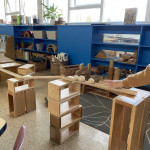Category: Uncategorized
We talk a lot about emotions and building a vocabulary of feeling words at school. Every year in June, we spend some time looking back over our whole year in Kindergarten and noticing how our feelings might have changed from the first days that we started together back in September. Many students reported that they remembered feeling nervous, scared, and a little bit excited when they started school. Now that they are Kindergarten experts, excited has stuck, but feelings of nervousness faded long ago. As they get ready to move on to Grade One, I asked if they have some words of advice for our new Kindergarten students, so that they will feel excited about coming to Brentwood Park in September. Here is what Division 21 said:
“There’s a lot of new friends at school. You will make new friends!”
- Aria
“You don’t need to feel scared, because you can PLAY! And you will have friends.”
- Summer
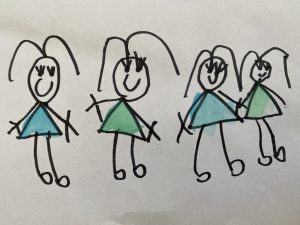
“I would like to tell them that Kindergarten is awesome, because you get to play and learn lots of new things.”
- Eva
“Everything will be okay. When it started, I didn’t know what it feels like. It was a little different, because it was a new language. It was okay because there’s more kids to help me. I can play and have fun with my friends!”
- Alex
“I want to tell the new Kindergarten kids, you will be excited when you come to school, because you will be playing with new friends.”
- Mia
“I want to tell the new Kindergarten kids that it’s good to make new friends and to face your fears. Because then you will learn so much! “
- Aviana
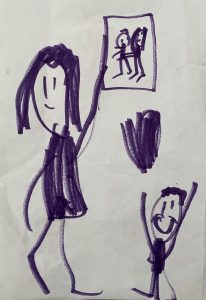
“You will like Kindergarten, because there are fun things to build with, like the big magna-tiles, that you haven’t tried before.”
- Anaya
“You don’t need to worry. You will meet new friends. I know all of the kids names right now, so I am not worried anymore.”
- Leonard
“They will like Kindergarten, because they will be safe. I know they will like Kindergarten, because our school is good.”
- Sebastian
“Don’t be scared. Because Kindergarten is good. You will play!”
- Morton
“You will like Kindergarten, because you will like to play with everything! And you will play with your best friend.”
- Khaly
“When you come to Kindergarten, we will be playing with each other. We’ll be kind. You’ll meet new friends.”
- Chloe
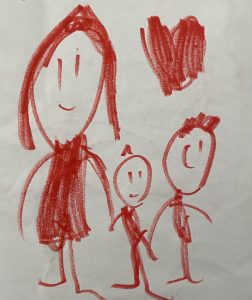
“There’s cars, tubes, tracks, big blocks, signs, Sharpies, building books … so many things! You can build anything you want at Kindergarten! I used to not know how to build skyscrapers, but now I know how to build tall towers.”
- Mateo
“Oh, I can’t even decide what is the best part about Kindergarten, because I like all of the parts so much! I want the new Kindergarten kids to know that you will get to do art, like painting. I LOVE painting.”
- Henry
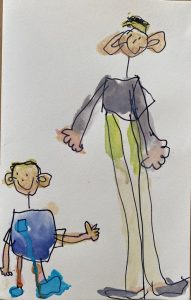
“You get to PLAY!”
- Mariano
“I want them to know that you get to play. You can learn new things. Even cartwheels!”
- Amelia
“You don’t need to be nervous when you come to Kindergarten. You’ll get to make lots of stuff and play!”
- Zoey
Students are always surprised to learn that their teachers also feel excited, as well as a little nervous, worried and even a bit scared at the beginning of every school year. What will this new bunch of kids be like? What adventures will we have together? What will our challenges be? Now that our year has come to a close, I am feeling sad to say goodbye, but excited to see what this amazing, creative, kind, curious bunch will do next!
Have a wonderful summer Grade Ones!
Love,
Mrs. Fleming
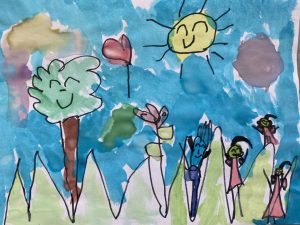
Throughout the year, we have been practicing a math routine called “Which One Doesn’t Belong?” or “WODB” for short. (Some of you tried it out at our Student Led Conferences). This idea comes from a book by the same name, written by Christopher Danielson. In the Fall, we started with sharing the book and talking about how objects might be grouped together, so that they all have something in common. Being able to describe, compare and sort objects is a part of the oral language and math components of the Kindergarten curriculum. 
To begin, I simply write “Which one doesn’t belong?” on the white board. Next to this question is a picture with four objects or images. The tricky part – the part that gets our brains really working first thing in the morning – is that all of the objects belong to the group, but all of the objects also DON’T belong to the group. The students can choose any of the four objects as the one that doesn’t belong, but they have to be able to explain WHY. To do this, they have to use lots of mathematical thinking and dig into all that they have discovered about colour, shape, size, sorting, number, patterns and much more. This is very different (and requires much more flexible thinking) than a traditional “which one doesn’t belong” task, in which there is usually only one correct answer.
Below is the flower “WODB” we did as a class this past week. Which one would you choose? Read through the students’ thinking – they seriously knocked my socks off with their ideas! Can you think of any other reasons WHY for your choice that we could add to our list?

Top Left
- because it is the only one with a smile that looks like an emoji
- because it is the only one in a mug that you can drink out of
- because it is the only one with a handle
- because it is the only one that is almost all yellow
Bottom Left
- because it it the only one that is only one colour: red
- because it is the only one that has only one kind of flower: roses
- because it has the most beautiful vase and red is my favourite colour
Top Right
- because it is the only one with lots of colours
- because it has the most flowers – too many to count!
- because it is the only one that has a colourful background
- because it is the only one where you can see far into the distance
- because it is the only one where the flowers are still growing in the ground
- because it is the only one where the flowers are in the dirt, not water
- because it is the only one that that has a sky and clouds above the flowers
- because it is the only one where the flowers look bigger close to us and smaller when they are far away
- because it is the only one with tiny trees far away in the distance
Bottom Right
- because it is the only one that looks like a pattern: pink, white, pink, white
- because it is the only one with a clear vase so you can see the stems
- because it is the only one with a square vase with straight sides, not curves
If you are looking for ways that you can incorporate more Math into your conversations with your child and would like to play with mathematical thinking at home, I would absolutely recommend checking out Christopher Danielson’s blog and signing up for his newsletter (tmwyk) at this link: Talking Math With Kids
Have fun talking math with your kids!
Our class has a magic “reset” button. If we are tired or grumpy or just having a blah sort of a day, we head outside. No matter the month or the weather, we always find something that sparks our curiosity and brings excitement and smiles to our faces.
We walk all over the school grounds and the neighbouring park a few times each week. As we have become familiar with this place, we have found favourite spots to revisit again and again. As reports are going home tomorrow and many students listed the outdoors as the best part of Kindergarten, we thought we should introduce you to some of these spots.
The Magic Forest
The Magic Forest – the group of big trees by the tennis courts – was one of the first places we visited as a class. By October, it was covered in leaves and then the Fall winds came and the ground was piled with pinecones. It has sparked conversations about really big numbers and if it is possible to count all of the leaves or pinecones in a forest. We swished our boots through the leaf piles and created numbers and cities with the pinecones. When we looked carefully at the trunks of the trees, we found mushrooms sprouting everywhere – inspiring many magical stories about who or what might live in our forest. When it rains, we stop and take big deep breaths under the dripping evergreen branches – which they always claim smells like coffee! Now, we are excitedly watching for signs of Spring and predicting when the “naked trees” will sprout leaves again.



Puddle World
Just beyond our school playground is a mostly flooded and muddy field, that we call “Puddle World” (thank you for the name, Aviana!) We have been very curious about where the water pools and the pathways the water takes as it flows down to the storm drains. For a little while, Puddle World froze over as the temperatures dipped down and it became Ice World. Then, as the ice melted, the field has become Mud World. We have even found a “mud rainbow” in this field.


The Spinner Playground
If we continue past Puddle World and walk through the Magic Forest, we will arrive at the Spinner Playground. Recently, this has been a favourite place to explore force and motion – there are so many opportunities to learn about pushes and pulls at the playground.
Teamwork and squeals of glee: Spinner

The River
The most requested place to visit this term has been “The River.” The ditch between the parking lot and the tennis courts has been a place of discovery and risk taking: for both the students and myself. When we first walked past the water, some students immediately wanted to get right in the water and explore. Some were happy to watch from the sidelines and the dry safety of the little bridge – myself included! Over the course of a few weeks, we returned to “the river” (as our class has named it) again and again. Students who very cautiously inched down to the water on our first visit, now hop back and forth without hesitation. We are all happy to get right in and play with the water flow and move around the rocks. We have noticed that at the end of our river, the water flows into a storm drain that we know will eventually lead to the ocean and to the fish. We always make sure to remove any garbage we find, because we don’t want all of that plastic getting into our oceans.



It is hard to explain how important this little trickle of water has become to our class or how magical it can be when we are all engaged with different activities connected to this place. Here are a few of the reasons they thought that you should know about:
“We like to collect the rocks.”
“The water is awesome.”
“There is a nice bridge, so I can stay dry. We make Marvel movies with Alexine and Ms. R when we are there.”
“We can go fishing.”
“We play the cheetah game!”
“The best part of visiting the river is listening to the sound. The water makes a quiet sound.”
“The river is way better than a boring old playground. It’s like the most awesome playground ever!”
And sometimes, if we are lucky, we find something wiggling in the water: The Worm
We are very protective of the worms.
We are already making plans for our Outdoor Explorations after Spring Break. We definitely want to visit Beecher Creek more often. We are also thinking about a Butterfly Garden so the painted lady butterflies we will be raising will have a happy home. Stay tuned!
Have you heard your child talking about loose parts at school?
Loose parts are open-ended materials: collections of small items that we can use for just about anything that you can imagine. Actually, just about anything that the kids can imagine!
Loose parts are a big part of our Math program in Kindergarten. The first concept that we played with a lot in the first term and will revisit all through the year is Patterns. Recognizing, building and extending patterns is an important part of our early learning curriculum. Practicing this skill with beautiful materials is highly motivating for most kids.


We count them and sort them and build shapes with them and measure and compare size with them … there really isn’t a Math concept we can’t practice with loose parts!

One of the ways that we encourage our emergent writers to write, is to first build their stories with loose parts. Story Workshop is a twice weekly part of our schedule in which a big chunk of our time is devoted to finding our stories in materials. The Story Lab is a place where we can build and keep stories set up for longer stretches of time. As children play with loose parts, they instinctively engage their imaginations. A cork, for example, might be a person, an animal, or a turret of a castle. I am always amazed at the creativity and flexible thinking that the children demonstrate when working with open-ended materials!




Sometimes loose parts lead us to explore ideas that I could never plan for. Recently, my small collection of old keys has quite literally unlocked so much creativity and wondering. They had many questions about where the keys had come from and what they had been used for. They spent much time excitedly trying to find locks that might fit the keys; testing, re-testing and studying the differences in key shapes and sizes. Our hallway door became the focus of their imaginings for days. None of the keys fit perfectly, but they did apparently unlock access to a secret staircase hidden beneath the school. This group added to this secret stairway story over the course of a week, and when they were done, a new pair took it on and decided that if none of my keys fit, then they would just have to make some new keys of their own! The keys have taken on a life of their own and the excitement over their possibilities has stopped many curious people at our door.



Eva explains a little bit about how they discovered the “Secret Staircase”
FYI, the keys mostly came from my sister, who moved apartments A LOT when she was in her 20s. She ended up with a big bag of useless keys and I was happy to take them for Kindergarten. If you have a collection like this at home, please send it to school! You can never have enough loose parts.
As part of their first written report card, I always ask the students about their favourite activities at school. Where do they like to play at Kindergarten? What is the best part of their day? We have been together now for almost three months and they were all quick to answer. Some students found their favourites as soon as they stepped into the room, while others took some time to observe and settle in. You will be able to read your child’s reflection on these questions in the report that went home today!
Division 21 invites you on a virtual tour of our classroom, to see where they love to spend their time at school. We are working on this blog together, so to begin with, we have chosen some favourite places to play at Explorations.
Tunnels, Tracks and Towers
We LOVE to build. We combine all sorts of building materials to create tunnels and tracks that stretch from one side of the room to the other – sometimes even building under furniture. Some tracks are for balls to travel on and others are for cars. We work together to build the tallest towers possible.
click here to see a short tunnels video
The Kitchen
We LOVE to pretend. There is a corner in our room that our class has decided is “the kitchen.” It is located under the tree with the fairy lights. There is no sink or stove – just a play arch and a light table – which means that it can be anything you can imagine it to be. Early on, our class imagined that it was a place to cook, so we added some jewels, small pots and muffin tins. Many delicious things are created here every day. Over time, it has been transforming into a restaurant. We have added clipboards for taking orders and a cash register so customers can pay for their food – even when the customers are cats!
The Water Table
We LOVE to play in water. Many students listed the water table as one of their favourite places to play at Kindergarten. Some love to splash, scoop, drip water drop by drop and pour water from one container to the next. Others find stories when the frogs or whales or penguins are in the table. Sometimes, there is no water at all, such as when we used magnifying glasses and tweezers to look carefully at sunflowers like scientists.
We hope you have enjoyed this first virtual visit to our room. More sneak peeks coming soon!


